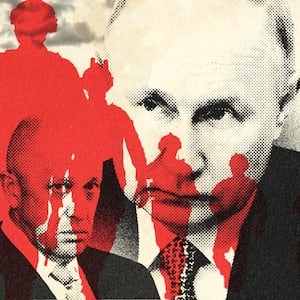Despite all of Belarusian strongman Alexander Lukashenko’s chest thumping about his involvement in negotiating an end to Wagner boss Yevgeny Prigozhin’s uprising in Russia, he might have set himself up for political instability, a top U.S. diplomat tells The Daily Beast.
With Lukashenko agreeing to have Prigozhin exiled to Belarus—and potentially having Wagner fighters move to Belarus—there are likely elite Belarusian politicians in Lukashenko’s circle who are eyeing the outcome of his negotiations with great distaste, U.S. Ambassador Michael Carpenter told The Daily Beast.
“I’m sure the top power in nomenklatura in Belarus is looking very carefully at what has occurred,” Carpenter, who has tracked the ins and outs of Lukashenko’s rule for years, told The Daily Beast. “Some of them are beholden to Russia and others very much want to chart a course for an independent, sovereign Belarus.”
And with Wagner mercenaries potentially on their way to resettle in Belarus following the uprising, many elite Belarusians are likely on edge about having killers and convicts with brutal reputations for killing on their territory, Carpenter said.
“You’ve got an armed mercenary group that has proven that it’s willing to take on the very power that sustained it for a long period of time. It doesn’t seem like a very good move” to have them inside Belarus, Carpenter said. “It certainly doesn’t seem like a great idea for anyone inside Belarus.”
Lukashenko jumped in last week to help Russian President Vladimir Putin talk Prigozhin down as the Wagner chief ordered his mercenaries to march toward Moscow, calling for the removal of Russian Defense Minister Sergei Shoigu. And ever since he helped broker the deal that got Prigozhin to call off the revolt, Lukashenko has been boasting about his negotiation skills.
His efforts to tout it as a major negotiating win for Belarus, though, might belie the true political complications the deal may introduce within the country.
“He’s been spinning it for propaganda purposes as sort of a brilliant coup of diplomatic work… but certainly not from the Belarusian perspective,” Carpenter said.
The mutiny in Russia, which represents perhaps the greatest challenge to Putin’s grip on power ever, has left the power dynamics and stability of the entire region up in the air. It’s unknown where Wagner mercenaries will go in the coming days and weeks, and it’s unknown where Prigozhin is at this time.
The same remains true for internal power dynamics inside Belarus, Carpenter warned.
“What does this change? I think it’s a little too early to tell,” Carpenter said. “Because it depends on the nature of the so-called power vertical in Russia, and how that influences the power vertical in Belarus.”
Although Lukashenko claimed early this week that Prigozhin had arrived in Belarus, the White House National Security Council noted Friday that it does not have certainty on where Prigozhin is. “We don’t have information that we consider—deem reliable enough” to confirm his whereabouts, John Kirby, National Security Council coordinator said on a call with reporters.
But reports have emerged in recent days suggesting that field camps are being set up for Wagner fighters in Belarus, with satellite images showing further likely preparations.
Lukashenko has long been beholden to Putin’s political whims. But in previous years, Lukashenko has wanted to maintain some openness to the West and wiggle out from underneath Putin’s influence, former U.S. officials who have tried to work with Lukashenko have told The Daily Beast.
This mutiny, and his apparent role in negotiating the end of it, shows Lukashenko coming out with a little leverage over Putin, said Evelyn Farkas, the former deputy assistant secretary of defense for Russia, Ukraine, and Eurasia.
”The sovereignty of Belarus is hanging by one thread. And if he has Prigozhin in his custody… then that would be maybe adding one more thread to his thread count. Or… another card that he can play,” Farkas told The Daily Beast.
“Lukashenko is trying very hard to show the world that Belarus is still a sovereign country, that there’s still some independent action that he can take, which is very limited,” Farkas added.
But it’s not likely that Lukashenko will be interested in making legitimate concessions to the West at this point, despite his track record, Farkas predicted.
“Having Prigozhin in his custody… he could deliver Prigozhin to the international courts, he could deliver Prigozhin to the West, he could unleash Prigozhin on Ukraine… he could end up being pressured by Putin to let the Wagner people go over his border,” she said.
Carpenter is not convinced there’s any room for Lukashenko to make those kinds of overtures to the West right now.
“It is true that over the course of his rule he has tried to play off different sides and gain some latitude,” Carpenter said, but “there’s very little scope for Lukashenko to at this point, and very little real opportunity for him to chart a course [other] than the one that he’s currently on, which is alignment with the Kremlin on almost every policy matter.”







